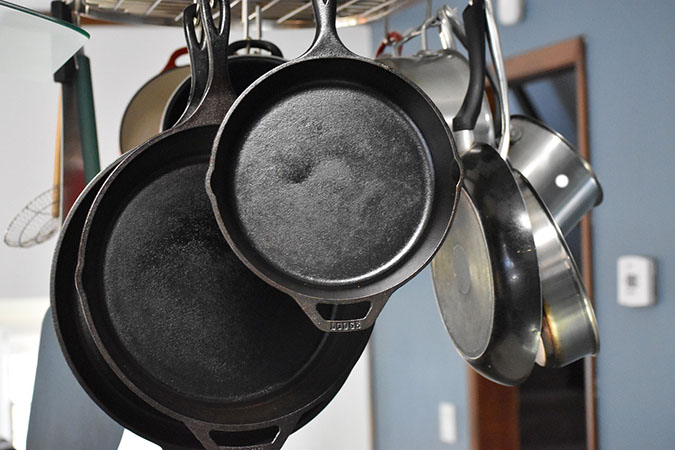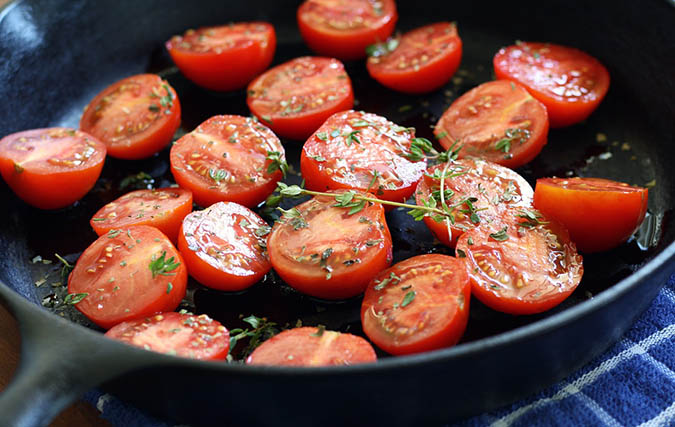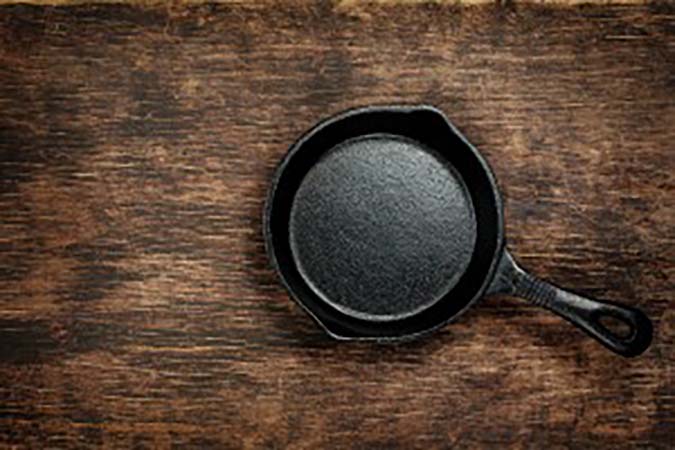Find a rusty old gem of a cast iron skillet? Here’s how to season a cast iron pan so you can put it into glorious use on your stovetop!

Image by Ernest_Roy from Pixabay
Season a Cast Iron Pan in 4 Easy Steps
I first jumped on the cast iron train more than a decade ago—and a big part of that was learning about how to season a cast iron pan properly.
Back when I was a kid, I remember we had some old cast iron pans we didn’t use. They were rusty things and were eventually consigned to lying alongside the carport. Now, I wish I could go back in time and save them. All but two of the cast iron pans I now own were originally discovered in antique shops and thrift stores … then reclaimed through cleaning and seasoning.
You May Also Enjoy:
“How to Make Bacon in 6 Easy Steps”
When I was younger, I never thought all that much about cookware, other than to quit using aluminum and Teflon in favor of stainless steel. I used to have some really nice stainless pans. No more. Now I’m a hard-core cast iron pan user—especially for frying.
Once you’ve cooked on a well-seasoned cast iron pan, you’ll never want to go back to weird, nonstick surfaces and stainless scorch-fests.
To show you how I season a cast iron pan, I created a video on how I clean up and season cast iron quickly and easily with just some steel wool, oil, and my oven. Check it out…
Seasoning cast iron well can convert an old pan from being a pain to cook on, to being a delightful surface.
How to Clean and Season a Cast Iron Pan

Image by Aline Ponce from Pixabay
Here’s a quick overview of the steps I follow to prepare the pan in the video:
Step #1—Clean Up the Cast Iron
A metal brush can work for this step, but I like good old steel wool. I’ve also sanded cast iron smooth with some light sandpaper. The idea is just to get the rust and junk off your pan so you can start fresh.
Step #2—Wash the Pan
Wash any gunk and metal filings from the pans with simple dish soap and water, then towel dry your pan thoroughly.
Step #3—Oil the Pan
My favorite oils for seasoning cast iron are lard and tallow. I think the saturated fat does a nicer job than just vegetable oil. Coconut oil works, too, but if you don’t have any of those three, just use whatever cooking oil you have lying around in your pantry.
Step #4—Bake the Pan at 500°F
Some directions will tell you to cure cast iron at 350°F. This has never, ever worked well for me. When you season the cast iron pan at 500°F, it really bakes that oil coating into the iron and gives the cast iron a glossy, solid black surface.
Follow these 4 steps when you season a cast iron pan, and you’ll be transported into a new realm of sauté bliss. (And, for more on everyday cleaning and maintenance of your cast iron, check out the tips in the comments below!)
What Do You Think?
What’s your favorite way to season a cast iron pan? Let us know in the comments below!
__________________________
The Grow Network is a participant in the Amazon Services LLC Associates Program, an affiliate program designed to provide a means for our team to earn fees for recommending our favorite products! We may earn a small commission, at no additional cost to you, should you purchase an item after clicking one of our links. Thanks for supporting TGN!
David The Good is a Grow Network Change Maker, a gardening expert, and the author of five books you can find on Amazon: Compost Everything: The Good Guide to Extreme Composting, Grow or Die: The Good Guide to Survival Gardening, Totally Crazy Easy Florida Gardening, Create Your Own Florida Food Forest, and Push the Zone: The Good Guide to Growing Tropical Plants Beyond the Tropics. Find fresh gardening inspiration at his website TheSurvivalGardener.com and be sure to follow his popular YouTube channel.








COMMENTS(8)
It appeared that your stove was pretty scratched up in a ring around the large burner. Is that from using cast iron pans on the stove top?
No – it’s actually from boiling sugarcane. The overflow caramelized my stove. Heh.
I had a fire start in my big iron pan months ago. I put the iron lid on and carried it out to the yard and cooled it in the snow. Now I can’t seem to get the soot and char out of it. Any ideas?
HI~
LIke the cast iron video, but some of the ones I find to fix also for others, are so PITTED…any remedy? sandblast?
thanks
em
Maybe I’m a purist, but I never use any kind of soap. As David mentions, the heat of cooking takes care of any contaminants…and when you season the cast iron, 500 degrees is more than sufficient!
Using a cordless drill with a wire attachment speeds up the cleaning process prior to seasoning. ((If you are going to do any of this by hand, have a good pair of black neoprene gloves!))
I do like to use hot water after cooking when the cast iron is still hot. The temps bubble off most any residue and the rest can be wiped out with a paper towel. A quick shot of oil, if needed, keeps your cast iron properly seasoned.
Couple years ago I revived a couple rusty Cast Iron. I used my cheap sand blaster, compressor and a sack of sifted sand to remove the rust. Then used orbiter sander to remove ‘rough’ spots. Followed by lots of hand sanding. Then proceeded at STEP 2. Took a couple attempts at ‘curing’ to get it right.
Shouldn’t Step 5 and 6 go on to describe proper use and cleaning? ie not TOO much heat and don’t soak.
Timely information. I have been struggling with my new cast iron skillets curing properly and it’s the temperature, I’ve been using 350 without success. Thanks! I must agree with the above comment though, a trustworthy plan for caring for my cookware would be helpful. I just received a set of baking dishes of cast iron and I’m a total newbie to baking with them!
500 for how long? pan right side up or upside down? other methods have not worked for me.